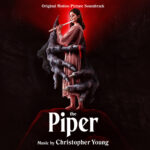Lakeshore Records edit Spy Kids 4
[ALSO IN SPANISH] Check it out!
Lakeshore Records will release on CD (also available for download via iTunes) the soundtrack for the fourth Spy Kids film, titled Spy Kids, All the Time in the World in 4-D, composed by Robert Rodriguez and Carl Thiel, with a 45 minutes score where we find a torrent of action music and latin rhythms for the new adventure of the Cortez family.
Small Saga Summary
 In 2001 it started a film franchise by the hand of Robert Rodriguez, an expert on this kind of subjects (as he did with El Mariachi). The title was Spy Kids, an action film for children and youth with successful humorous gags for the whole family, where Antonio Banderas and Carla Gugino starred as a couple of spies, whose children were completely unaware of their job (Alexa Vega and Daryl Sabara as Carmen and Juni).
In 2001 it started a film franchise by the hand of Robert Rodriguez, an expert on this kind of subjects (as he did with El Mariachi). The title was Spy Kids, an action film for children and youth with successful humorous gags for the whole family, where Antonio Banderas and Carla Gugino starred as a couple of spies, whose children were completely unaware of their job (Alexa Vega and Daryl Sabara as Carmen and Juni).
Parents were kidnapped by the villain of the moment (a delirious Alan Cumming, but the real villain was Tony Shalhoub, Monk‘s series famous inspector), and children should improve their skills to rescue their parents, helped by his uncle Machete (the great Danny Trejo).
The first soundtrack featured several composers assigned to the score, forming a diverse and brilliant mix of styles that worked perfectly, from the villain’s song (Floop’s Song) composed by Danny Elfman in his typical Burton style, to the hispanic style from the hand of Robert Rodriguez and Heitor Pereira along with Los Lobos in Oye Como Spy or the rhythmic and vibrant piece called Spy Wedding, without forgetting the great work of John Debney and Harry Gregson-Williams for cuts as The Spy Plane and Final Family Theme, respectively.
This first edition of the soundtrack, released by the extinct label Chapters III Records , is now completely out of print, and its half-hour of music becomes short, being totally dispensable the final song. Maybe some label can rescue this soundtrack and publish it with more material.
The second part, Spy Kids 2: The Island of Lost Dreams (2002), was even more crazy and wacky, but made a drop in the quality of saga, with only the highlighted presence of Ricardo Montalban as the father of Antonio Banderas and Steve Buscemi as the quirky scientist who created all the creatures of the island.
The new score was composed by Robert Rodriguez and John Debney, and there they showed a greater homogeneity in the set, where highlights Debney’s orchestral part, a perfect complement to the latin tinge of the Cortez family, courtesy of Rodriguez, as in SpyParents, the rhythmic part of the Treehouse final cut or the Mothership/SpyGrandparents cut.
Edited by Milan label, and still available at a good price, it’s a more than correct and exciting action-adventure score, maybe a little old-school, where the mythological creatures from the Island of Lost Dreams lead to the use of epic and heroic melodies, recovering an old Herrmann musical style (as in the Mysterious Volcano Island track, or the fight with the skeletons in Skeletons track, where an aggressive percussion reminds us the work The 7th Voyage of Sinbad from the Master).
For the third part of the saga, Spy Kids 3-D: Game Over, a frenzy of film that sends the quality of the series totally downhill, Rodriguez chose Sylvester Stallone as the villain of the story, and always refreshing and remarkable presence of the muse Salma Hayek.
 This time, the score was composed by Robert Rodriguez, with some parts that have their musical limitations. Rodriguez offered some touches of comedy and fun that sometimes recall the melodies typical of video games (contrasting with the images). He used synthesizers as the central pillar of the ensemble, as in Pogoland track, also with great themes for the Cortez family, as in the beginning of the Metal Battle track or the Bonus Life track, or in the rhythmic Lava Monster Rock, featuring the main theme with shades of rock.
This time, the score was composed by Robert Rodriguez, with some parts that have their musical limitations. Rodriguez offered some touches of comedy and fun that sometimes recall the melodies typical of video games (contrasting with the images). He used synthesizers as the central pillar of the ensemble, as in Pogoland track, also with great themes for the Cortez family, as in the beginning of the Metal Battle track or the Bonus Life track, or in the rhythmic Lava Monster Rock, featuring the main theme with shades of rock.
Edited by Milan Records, and with two songs really unnecessary (one song opens the score and the other is the end remix), is easily findable in the market for soundtracks.
Spy Kids: All the Time in the World in 4-D
For this new release, Robert Rodriguez introduces a new character, Marissa Cortez Wilson (Jessica Alba), a retired spy that’s now the mother of a baby and has two stepchildren about to enter in adolescence.
Everything changes when a villain comes into action… stopping the time. This villain is known as the Timekeeper (Jeremy Piven).
Rodriguez ignores the characters of Banderas and Gugino, but recovers Uncle Machete and the grown Carmen and Juni (the Cortez children), and adds actor, writer, musician and comedian Ricky Gervais, who lends his voice in the original version to Argonaut character, a robot dog that will help the kids to fight Timekeeper. Having seen the trailer, it becomes clear that the tone is mostly childish, with comical twists aimed at that audience, rather than to an adult audience.
The score released by Lakeshore Records, includes three quarters of an hour of action-adventure music, in line over the first two jobs, recovering some orchestral tones through synthesizers and electronics, which perfectly conceal the lack of organic instruments (with a quality above the third film score).
Rodriguez joins Carl Thiel, a regular contributor to this director, who has produced rock music and other soundtracks, such as Machete, Planet Terror or Spy Kids 3-D (where he also composed additional music), in addition to receiving a nomination in the Latin Grammy Awards for his work on the album Papito by Miguel Bosé (a Spanish singer and writer).
Thiel and Rodriguez recover the tone of espionage and adventure through the central motifs from the first film (for Family Cortez), as in the Juni Cortez track, or the great Spy Mom, where some rhythmic electric guitar riffs define the central theme.
 The composers also offer us some exciting action music, such as Hammer Hands, with nearly three minutes of action truly fantastic, whose main melody is presented before in Argonaut (the character of the dog), or in Jet Lug Chase or Panic Room tracks.
The composers also offer us some exciting action music, such as Hammer Hands, with nearly three minutes of action truly fantastic, whose main melody is presented before in Argonaut (the character of the dog), or in Jet Lug Chase or Panic Room tracks.
And of course, we have a motif for the villain, The Timekeeper, through suggestive and evocative sounds that reflect the vile nature of the character, with a musical touch almost like a mockery, all in a very rhythmic way.
This motif is also used in action tracks, as in Time’s Up, probably the climax of the film where our heroes will face Timekeeper.
Rodriguez and Thiel also introduce mysterious themes in clear referece to the plot line, with sounds that reflect the sense of fantasy of the story, as in Time and Time Again or in Danger’s Past, two excellent fantastic cues.
In a few words, this is a great score that will delight all fans of the saga, and is a wholesome entertainment that will provide you a good listening time, with remarkable tracks as Hammer Hands or Spy Mom.
The CD will be released on September 6, although it’s already available via iTunes since August 16, and here you have a small oficial preview about the score.
Translated by : Pablo Laspra




